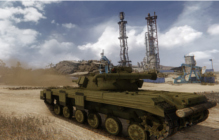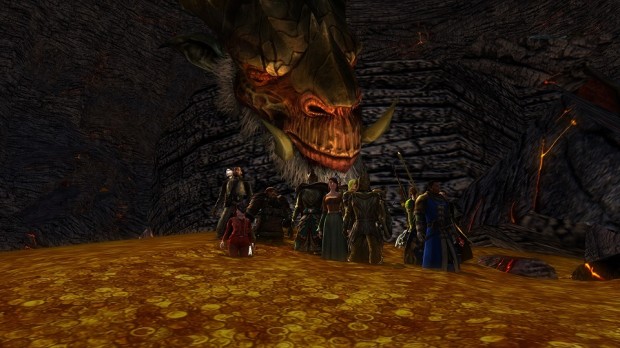Ex-LOTRO Dev Dishes On Turbine's Missteps
A former Lord of the Rings Online Systems QA employee going by Aylwen has penned a long series of posts over on the LOTRO Community forums (not the official community forums for the game), calling out several current and former Turbine employees by name and painting a generally pessimistic picture of the work and work environment that exists at the LOTRO developer's home base.
It's an extensive and suitably grim series of posts, a train wreck that a long-time LOTRO fan such as myself can't tear his eyes away from, and also contains tidbits about other Turbine games and The Elder Scrolls Online. (Aylwen recently worked for ZeniMax Online Studios.) Even accounting for some likely personal bias, it's hard to argue with many of the points and observations Aylwen makes. To sum up the major points:
* Player vs. Monster Player combat (the main topic of the thread) has been knowingly neglected for years, and wasn't even planned for inclusion in the game until "marketing" stepped in and insisted on some form of player vs. player combat. Aylwen cites that only 7% of players participate in it. Monster players were conceived of as "literally playable NPCs" and testing was usually light to nearly non-existent, as "the class devs weren't required to consider the effects of their changes vis-à-vis PvMP."
* Turbine pitched a Harry Potter MMO to Warner Brothers, before WB bought the studio, but it was turned down. Also, a console version of LOTRO was explored, costing the company millions of dollars but not ever proceeding past initial stages.
* On a similar note, the oft-quoted "Only 10% of our players raid" figure is, in Aylwen's mind, "a juked number."
* Free-to-play was not dictated by Warner Brothers, but, along with the sale of Turbine to WB was "a deal with the devil that in retrospect had to be made." Apart from Executive Producer Kate Paiz, "nobody was happy about the move." The WB sale wasn't about acquiring Turbine's gaming properties, but about acquiring the company's general expertise in supporting online games.
* Six months before LOTRO went F2P, it was confirmed that the game had about 85,000 active subscribers. Very briefly, it was considered that lifetime subs wouldn't apply to F2P, but that was quickly transformed into lifetimers being granted permanent VIP access.
* Mines of Moria, the first expansion, had plenty of good ideas, but less-than-stellar execution, with things like legendary items and radiance. "We lost a lot of subs that winter," Aylwen states. Legendary items were "bad core design. I'm still not sure how one would even go about revamping it and it seems they don't know either."
* Siege of Mirkwood, the game's second expansion -- which was barely bigger than an update, and Aylwen calls a "budget expansion" -- was when things really started going downhill.
* The Player's Council was a "well-meaning gimmick but silly in a lot of respects."
* Some changes, such as the class redesign and the removal of stars in PvMP, were brought about by a developer listening to a very small number of voices on the forums, not because of any request by a great number of players.
* WoW clone alert: "the LOTRO team borrowed freely from Blizzard's game."
* The relationship between Turbine and Codemasters, who operated the game in EU, was "downright acidic."
* Infinite Crisis cost a lot of money -- $4 million a month to develop -- and tanked badly because of the belief that it could be developed into the next major e-sports craze. According to a friend of Aylwen's, who was just let go from Turbine in the fall, it has/had a peak concurrency of just 1,000 users.
* As for Elder Scrolls Online, a producer for the game thought that half the team believed they were making a single-player game and the other half thought they were making World of Warcraft.
* When the end comes for LOTRO, it'll be sudden, Aylwen thinks. "When they do finally kill it I wouldn't expect much in the way of a warning: nobody is going to drop money on micro transactions for a game slated to shut down in two or three months."
Despite it all, Aylwen enjoyed much of his time with the company, even going back for a second stint of employment, and recognizes the difficult nature of MMO design, especially given the challenges faced by Turbine: "the very fact that this little company, that in 1998 or so operated out of a garage basically, managed to build and maintain three well-known MMOs is an incredible accomplishment. Really it should have been impossible." Aylwen paints the company as ambitious, but unable to meet that ambition with the proper expertise; anyone who's lived through seven-plus years of the game would tend to agree.
(Thanks to MassivelyOP for the link)
Related Articles
About the Author

Jason Winter is a veteran gaming journalist, he brings a wide range of experience to MMOBomb, including two years with Beckett Media where he served as the editor of the leading gaming magazine Massive Online Gamer. He has also written professionally for several gaming websites.
More Stories by Jason WinterRead Next

My.com has partnered up with YouTuber The Mighty Jingles to release a comprehensive video on how you can expect to progress your way though their upcoming, free-to-play tank warfare game, Armored Warfare. Earning new tanks ...
You May Enjoy

These heroes are some of the best ban targets to consider in Season 5 & Season 5.5

Despite the name, this granary is far from normal.

While showing off the combat for upcoming Agents Ye Shunguang and Zhao.

Fight in snow-covered arenas during the Winter Raid event.

Discussion (4)